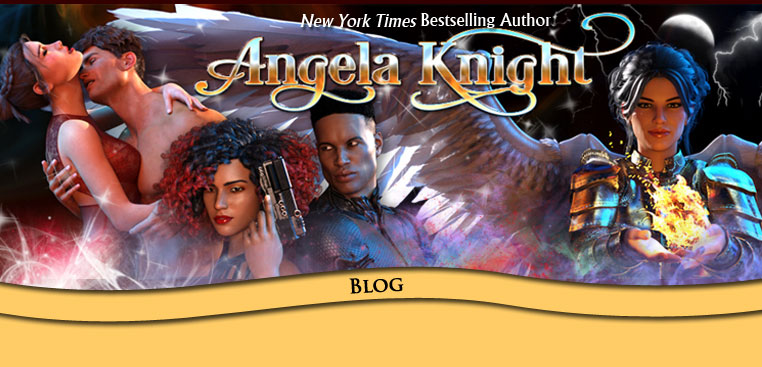I had a great time talking with Angela on my Ghost in the Machine podcast
http://gzmartin.audioacrobat
Angela writes paranormal romance and I write fantasy adventure, it was fun
to share our love for vampires and the supernatural. I’m much more
interested in a story if it has ghosts, vampires and haunted houses—with
some romance as well!
It’s fun to see how much “our” type of fiction has gone mainstream.
Finding a romance book with a hint of anything ghostly or supernatural used
to mean digging through a handful of “gothic romance” titles. Now,
vampires, werewolves and supernatural romance rule. It’s blurred some of
the old lines between romance and fantasy, which is a good thing. I do a
lot of book signings, and I see how people wander through bookstores. Most
people head right for their favorite section and never look around at all
the great books they might like that are shelved elsewhere. After talking
with Angela, I wandered through the romance isle and was delighted at the
types of stories I found that had a great mix of paranormal and passion. I
dare you to explore the fantasy aisle where my Chronicles of the
Necromancer books are shelved (The Summoner, The Blood King), and you might
just discover that there’s more than a dash of romance spicing up tales of
magic and mayhem! Gail Z. Martin—www.ChroniclesOfTheNecr
omancer.com
Please drop by and take a look at her site!
And here's what I have to say about Gail in particular and SF in general...
I was really honored when Gail asked me to be interviewed in a her podcast on her website. I had a ball talking to her about creatures that go bump in the night, and why writers and readers can't seem to get enough of them.
I'm also a huge fan of science fiction and fantasy, and have been for years. True, I write romance, but I also love having my imagination and sense of wonder challenged. That's something Gail does with flair!
Urban fantasy is another genre that really speaks to me. I'm hooked on Jim Butcher's Dresden Files series, along with Laurell K. Hamilton's Anita Blake and Merry Gentry books. I adore the Sookie Stackhouse series by Charlaine Harris, as well as Pat Brigg's Mercy Thompson series. Other keepers include anything by Wen Spencer and Lois McMaster Bujold, who is simply wonderful.
As a writer, I've recently begun work on a new science fiction romance series called TIME HUNTERS. The heroes are genetically engineered cyborgs who leap through time in pursuit of time traveling criminals. I just finished the first book of the series, Time Hunters: WARRIOR. Look for it in July.
For more about my work, check out my website at www.angelasknights.com. I'm in the process of having the site revamped, and I hope to have it up soon. Thanks!
Angela Knight
Please drop by and take a look at her site!
And here's what I have to say about Gail in particular and SF in general...
I was really honored when Gail asked me to be interviewed in a her podcast on her website. I had a ball talking to her about creatures that go bump in the night, and why writers and readers can't seem to get enough of them.
I'm also a huge fan of science fiction and fantasy, and have been for years. True, I write romance, but I also love having my imagination and sense of wonder challenged. That's something Gail does with flair!
Urban fantasy is another genre that really speaks to me. I'm hooked on Jim Butcher's Dresden Files series, along with Laurell K. Hamilton's Anita Blake and Merry Gentry books. I adore the Sookie Stackhouse series by Charlaine Harris, as well as Pat Brigg's Mercy Thompson series. Other keepers include anything by Wen Spencer and Lois McMaster Bujold, who is simply wonderful.
As a writer, I've recently begun work on a new science fiction romance series called TIME HUNTERS. The heroes are genetically engineered cyborgs who leap through time in pursuit of time traveling criminals. I just finished the first book of the series, Time Hunters: WARRIOR. Look for it in July.
For more about my work, check out my website at www.angelasknights.com. I'm in the process of having the site revamped, and I hope to have it up soon. Thanks!
Angela Knight

